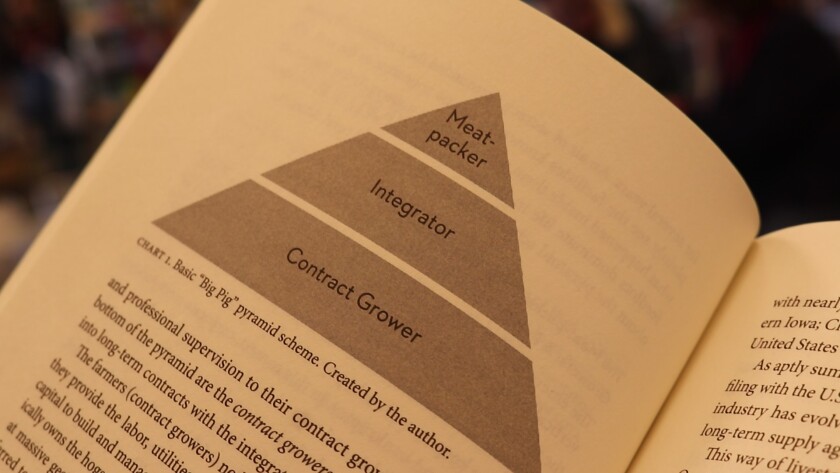ROCHESTER, Minn. — Sonja Eayrs was raised on her family's farm in Dodge County, about 30 miles west of Rochester, which still operates today. Her grandparents moved onto that farm 100 years ago.
"My dad was one of 10 children, and all those 10 children were raised on our farm, and that's where I was raised," she said at a recent book signing in Rochester. "There's something very special about being able to walk the same land as my grandparents and parents and aunts and uncles and other family members."
ADVERTISEMENT
Eayrs' book, "Dodge County, Incorporated: Big Ag and the Undoing of Rural America" has been named a finalist for the Minnesota Book Awards.
It details the first of many lawsuits filed by her parents against Dodge County officials and their neighbors, and their unique challenge against installations of corporate factory farms near their family farm near Blooming Prairie, Minnesota.
Eayrs said her family first were introduced to corporate agriculture in 1993, when the first swine factory farm was erected a mile north of their farm.
"People didn't really understand what was happening," she said of the time. "They didn't understand the significance of corporate agriculture and how it was going to fundamentally change rural America."
Eayrs' own involvement began in 2014 when she helped move her mother into an assisted living facility and with her dad who still lived on the farm.
"(Her father) received notice there was yet another swine factory farm going into the immediate area," Eayrs said. "Today, we have 12 swine factory farms in a three-mile radius."
A corporate system
She said those farms don't do much to boost the local economy but rather contribute to a massive consolidation of the industry.
ADVERTISEMENT
"What the industry has done is they have created a pyramid scheme, and at the top of that pyramid is the multinationals — so Hormel, JBS, Smithfield, Tyson, those are the big multinationals at the top of the pyramid," she said.
At the middle are what Eayrs refers to as the "integrators."

"The integrators own the supply chain ... " she said. "Those integrators provide the hogs, and they provide the feed and the veterinary services."
At the bottom of the pyramid scheme that Eayrs lays out in her book is the contract growers.
"What we used to call farmers," she said. "The only way that you can get your hogs to market is you have to sign a contract. The days of the independent farmer, unfortunately, have largely collapsed, and so this is a corporate system, and a corporate network that has been created in rural America."
Reaction from both sides
The reaction to Eayrs' book, which she began to write in 2019 shortly before her father passed, has been mixed with strong support and strong opposition, she said.
"Either you're very supportive or you're very opposed, and there doesn't seem to be a middle ground, unfortunately," she said. "My family has put up with tremendous harassment and intimidation that is largely curved because I've been so vocal and so outspoken. I frequently tell people that we went to the press not to grab headlines, but for our own protection."
ADVERTISEMENT
She said while she's gotten backlash from the farm community, her book is "absolutely" for farmers — especially ones who recognize themselves as part of the unfair system. Eayrs said she's been in contact with contract growers who have been taken advantage of in terms of price and delivery of animals to the marketplace.
"They've been locked out of the marketplace. This is not a free market," she said. "If you wanted to take a load of hogs down to Hormel in Austin, for example, they're not going to let you in. The only way you can bring a load of hogs to Hormel is if you have signed a contract with an integrator, and the integrator, they're in charge of the supply chain, so it's corporate injustice at its best."












